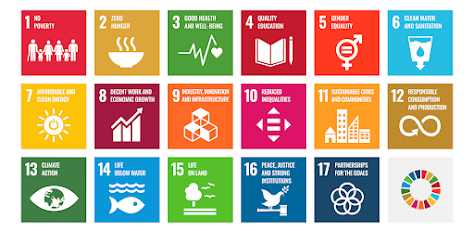Society is reaching a tipping point.
By 2030, we will have decided whether to embrace life on this planet, or death. We will have decided whether we support global growth, peace, equality, freedom, health and education, or a dog-eat-dog world where the "haves" choose to let half the world live in poverty and precarity.
This is a time when leadership will matter in every sphere: business, politics and community. As a leader, you must decide whether you stand with empathy, love and opportunity for all.
2030 is the turning point. 2030 is “The Year” that the United Nations has targeted for achieving its 17 Sustainable Development Goals (SDGs). It's also the year that countries and organizations are expected to achieve tangible progress in their plans to become carbon-neutral by 2050 - to save life on this planet from accelerated global warming and extreme weather events.
2030 is also the year that the last of the baby boomers reach retirement age - giving businesses and other organizations a chance to reset their leadership visions around more contemporary values such as creativity, collaboration, and serving all stakeholder communities, not just dividend-hungry shareholders.2030 must be a time when we celebrate the actions we have taken to clean the planet, encourage global growth, and end war, inequality, poverty, hunger and disease.
And as someone reminded me the other day, 2030 is just 400 weeks away.
Now is the time for business leaders to call a fresh start. How can we stop polluting the planet, and make it a better place? How can we evolve from serving customers to enhancing human life?
It’s not just
about climate/sustainability, but building a more just planet.
A number of the UN's SDGs aim straight at business:
* Goal 7: Affordable and clean energy
* Goal 8: Promote sustained, inclusive and sustainable economic growth, full and productive employment and decent work for all.
* Goal 9: Build resilient infrastructure, promote inclusive and sustainable industrialization and foster innovation.
* Goal 11: Sustainable cities and communities
* Goal 12: Ensure sustainable consumption and production patterns.
A recent “HumanKind Study” study by marketing firm Leo Burnett uncovered profound disconnects. In a poll of 4,633 Canadians, the study found that half of respondents are concerned they are “wasting their life” doing “unfulfilling work.” A full 76% of Canadian consumers said they don’t believe brands understand their problems.
Tahir Ahmad, Burnett Canada’s chief strategy officer, says employers and brands need to address these disconnects. We must find “a way forward that focuses not solely on profit or product, but on people, and how we can lead more fulfilling lives.”
PwC found similar disconnects in its 2021 Global Culture Survey. For instance, 63% of Canadian business leaders say their organizations have developed a distinctive culture that sets them apart from their competitors – but only 41% of employees share their belief.
Compared to American workers, the survey found Canadians have much higher doubts about their employer’s ability to adapt to change, set a positive “tone from the top,” or “act as role models for their organization’s purpose, values and culture.”
Companies that choose not to prioritize ecosystem interests, including the SDGs, will increasingly be seen as problems in a world desperate for solutions. Which side will you be on?
Now is the time for leadership. Executives must develop clear plans for their organizations, and for their employees, products, and customer relationships. They need to reconnect with their communities (not just “stakeholders”). As PwC reports, Canadians “want to see their leaders setting a clear path towards building trust by giving their people a shared sense of purpose, while also making sure they feel valued, connected and visibly supported.”
For business leaders, 2030 is a global target date for achieving more human-centred workplaces, more responsible production and consumption processes, and more sustainable and inclusive growth. That means more innovation (in products, services, and business methods), "decent work," and partnering with other companies, around the world, to create more win-win relationships.
Consider Tesla, which became the world's most valuable automaker simply because it saw the need for green energy sooner than its more established competitors around the world.
This is a manifesto
for a new way of doing business – and new ways of thinking about business. Redefining relationships with shareholders,
employees, customers and communities. Finding cost-effective energy solutions, decoupling growth from environmental
degradation, providing productive employment for all, building
better cities, and uplifting marginalized communities so all can share in the bounty of this planet.
The Government of Canada puts its 2030 mission this way: “Leave no one behind.”
As the boomers' "greed is good" mentality fades from the boardroom, what values will replace it? How will your business get ahead of this transition? How can you find, attract and motivate new leaders who understand
these transformative times and your changing customer base?
2030 is not just a deadline – it’s a once-in-a-generation opportunity.
By embracing change now, organizations will be in better shape to lead this transformation, become role models, and take advantage of all the new opportunities, relationships and regulations that will emerge as we move closer to 2030.
2030 is not not just about the SDGs. It's about choosing community over self, long-term thinking over short-term, stakeholder rights rather than shareholders' rights, and prioritizing human need over greed.
And it starts with us all, right now.



No comments:
Post a Comment